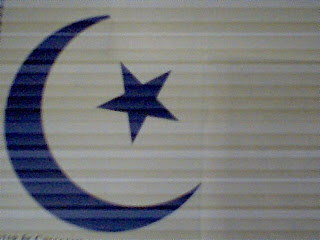
Muslims account for about 1/5th of the world population. Islam is the religious, cultural, and political organizing force for Muslims. Muslim history extends back to about 817AD to the Iranian Muslim ibn Al-Hajjaj. This early scholar compiled the Haddith, stories and deeds of the Prophet Mohammad from over 300,000 Islamic traditions from Arabia, Egypt, Syria, and Iraq.
The early story of Muslim is long, complicated by various Islamic sects, which stuggled to dominate the culture and politics, as well as the religious sector, of the Arab states, South Asia, and Africa.
In modern history, by 1906, Muslims created the "All-India Muslim League, a political group which advocated a separate Muslim state in India. This was encouraged by Great Britain, then the colonial overseer of India, until the 1913 Muslim movement to form an independent self-government in India. A moderate Muslim Muhammed Ali Jinnah called for a Hindu-Muslim alliance in India until 1940, when the Muslims began to fear independent India would be dominated by Hindus.
In 1947, the British granted independence to India, a partition was drawn, and adjacent Pakistan became a Muslim South Asian country.
Sharia was mentioned in the previous blog (13) discussing Muslim workers seeking special consideration (accommodation) in the workplace for prayer and other breaks during the daytime fast month of Ramada, the Muslim religious holiday.
Sharia is the law of Islam. Sharia laws apply to many aspects of secular law, including crime, politics, and economics, and personal life, including sexuality, hygiene, diet, prayer, and fasting. When "official" in a Muslim or non-Muslim "host" country, Sharia law is applied by an Islamic judge, a "qadis".
"Imam" responsibilities vary with the interpretation in a particular country. An Imam may be a communal prayer leader, a scholar, religious leader or political leader.
Muslims attempt to impose Sharia law in non-Muslim countries. The imposition of a second set of laws provokes controversy, violence, and even open warfare as in the Second Civil War of Sudan.
The role of warring Muslim sects in Afghanistan and Iraq where the US has been involved, is complicated, with shifting alliances, and has not been clarified in the American newsmedia.
Muslims have made in-roads into "host" countries. In India, some Muslim minorities have been able to establish Sharia courts to adjudicate personal and community issues. Even Britain has allowed a "Muslim Arbitration Council". A recent newsreport noted self-identified moderate Muslims in Canada supported local schools, Canadian laws and government--as long as the local system remains hospitable to Islam and does not interfere with Islamic practices, that is, Sharia Law.
The American equivalent of this "country within a country" demand would be the Native American Tribal Reservations, who obviously have long been a part of truly indigenous American history.
Graphic: Star & Crescent: The crescent was adopted as the symbol of Islam in the
14th Century, the star was added later. In The Illustrated Book of Signs & Symbols, M. Bruce-Mitford.
Other references: Encyclopedia Britannica; The World Book Encyclopedia, 2003;
SD Strouthes Law and Politics, www.Wikipedia.com.
The next blog in this series will discuss Sharia Taxes on Non-Muslim and Muslim residents of non-Muslim "host" countries and Muslim countries.
Email mkrause381@gmail.com or mkrause54@yahoo.com to comment or request a copy of this blog or others posted by mary for monthlynotesstaff on http://monthlynotesfive.com. Until indexing is complete the blogs in "five" will be available on http://monthlynotesfour.blogspot.com and http://monthlynotes.blogspot.com on www.google.com.